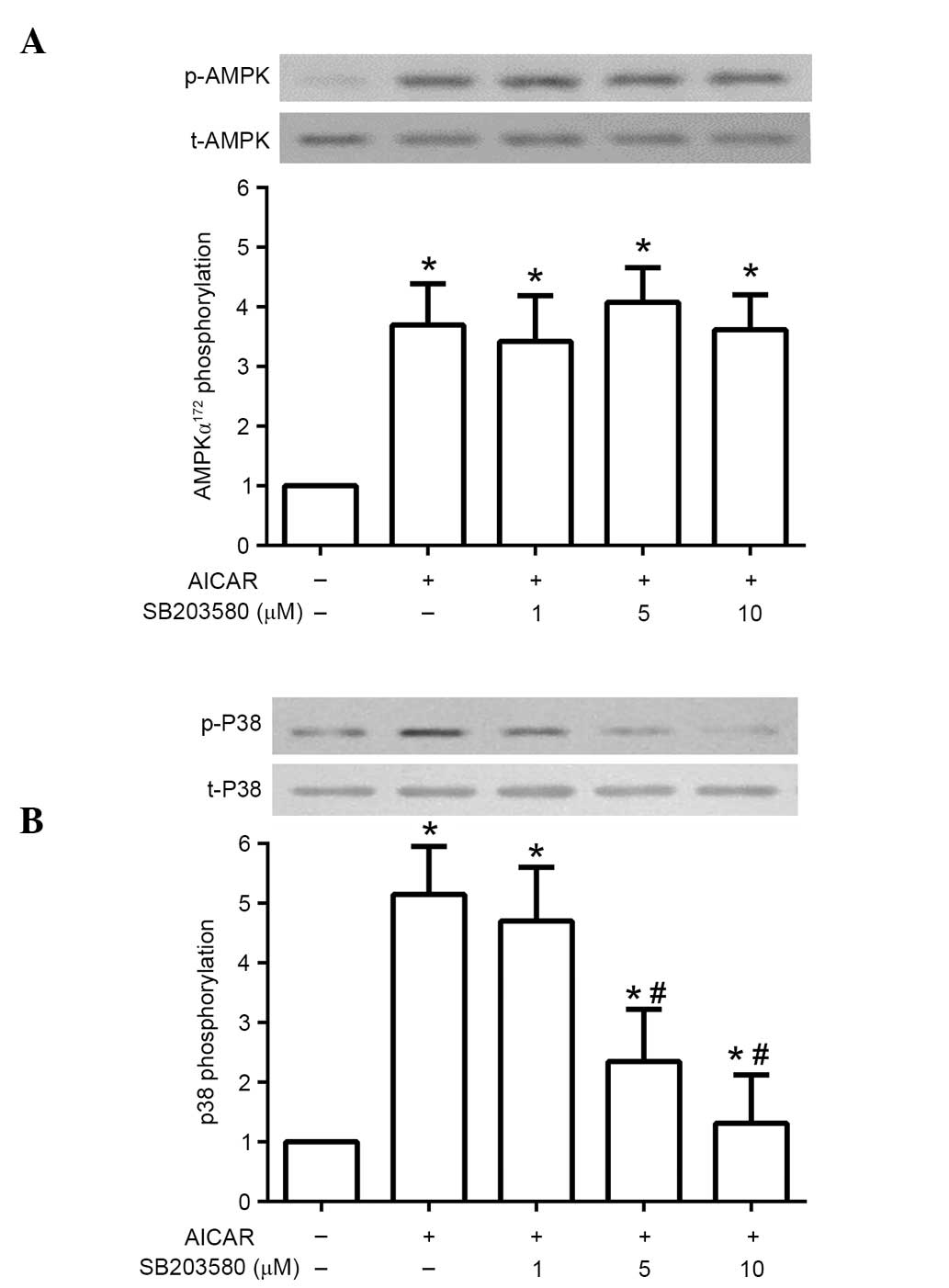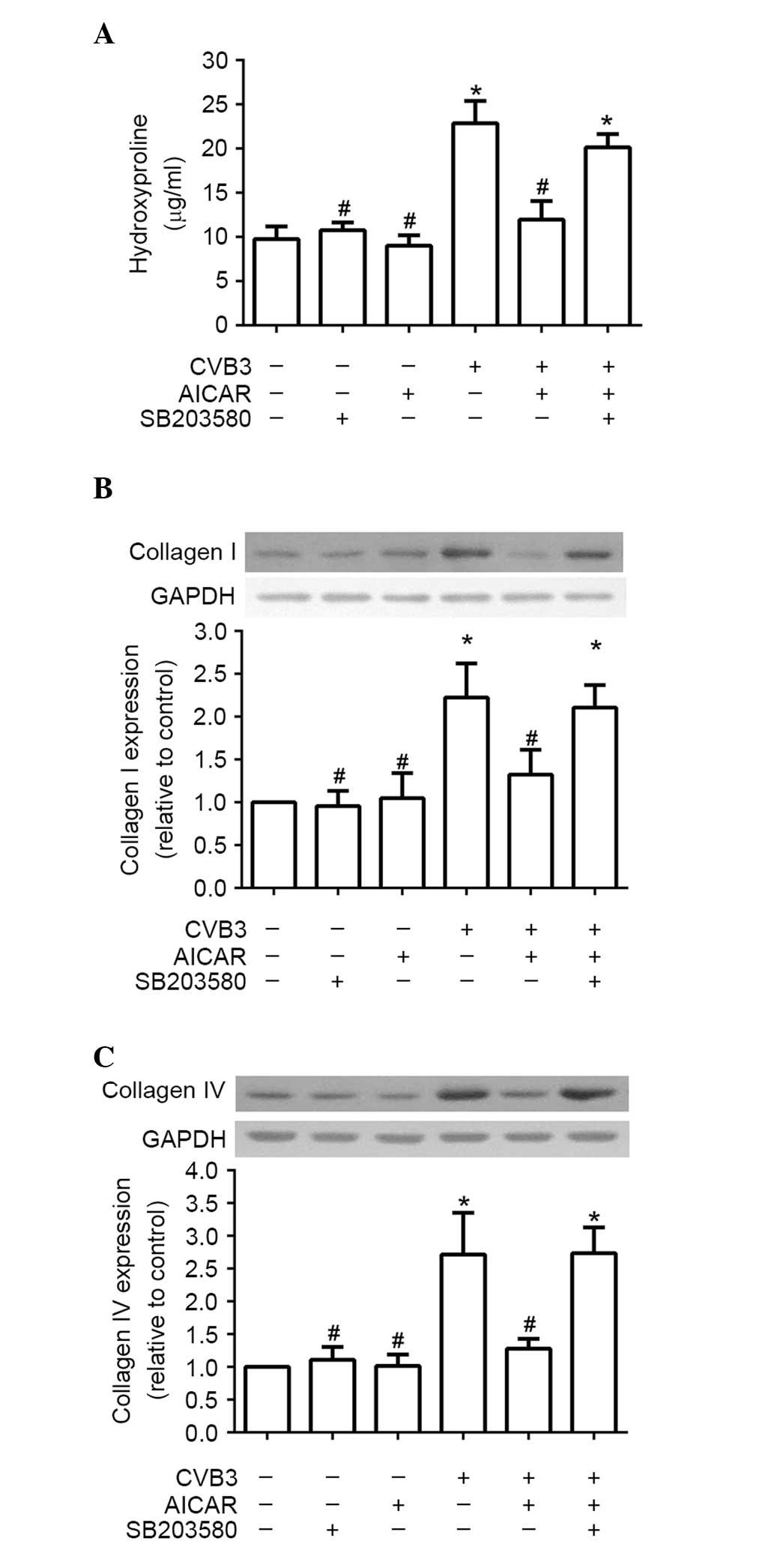|
1
|
Ellis CR and Di Salvo T: Myocarditis:
Basic and clinical aspects. Cardiol Rev. 15:170–177. 2007.
View Article : Google Scholar : PubMed/NCBI
|
|
2
|
Magnani JW and Dec GW: Myocarditis:
Current trends in diagnosis and treatment. Circulation.
113:876–890. 2006. View Article : Google Scholar : PubMed/NCBI
|
|
3
|
Sagar S, Liu PP and Cooper LT Jr:
Myocarditis. Lancet. 379:738–747. 2012. View Article : Google Scholar
|
|
4
|
Eghbali M: Cardiac fibroblasts: Function,
regulation of gene expression and phenotypic modulation. Basic Res
Cardiol. 87(Suppl 2): S183–S189. 1992.
|
|
5
|
Lindner D, Li J, Savvatis K, Klingel K,
Blankenberg S, Tschöpe C and Westermann D: Cardiac fibroblasts
aggravate viral myocarditis: Cell specific coxsackievirus B3
replication. Mediators Inflamm. 2014:5195282014. View Article : Google Scholar : PubMed/NCBI
|
|
6
|
Cao Y, Xu W and Xiong S: Adoptive transfer
of regulatory T cells protects against Coxsackievirus B3-induced
cardiac fibrosis. PLoS One. 8:e749552013. View Article : Google Scholar : PubMed/NCBI
|
|
7
|
Swaney JS, Roth DM, Olson ER, Naugle JE,
Meszaros JG and Insel PA: Inhibition of cardiac myofibroblast
formation and collagen synthesis by activation and overexpression
of adenylyl cyclase. Proc Natl Acad Sci USA. 102:437–442. 2005.
View Article : Google Scholar :
|
|
8
|
Zaha VG and Young LH: AMP-activated
protein kinase regulation and biological actions in the heart. Circ
Res. 111:800–814. 2012. View Article : Google Scholar : PubMed/NCBI
|
|
9
|
Horman S, Beauloye C, Vanoverschelde JL
and Bertrand L: AMP-activated protein kinase in the control of
cardiac metabolism and remodeling. Curr Heart Fail Rep. 9:164–173.
2012. View Article : Google Scholar : PubMed/NCBI
|
|
10
|
Xie W, Wang L, Dai Q, Yu H, He X, Xiong J,
Sheng H, Zhang D, Xin R, Qi Y, et al: Activation of AMPK restricts
coxsackievirus B3 replication by inhibiting lipid accumulation. J
Mol Cell Cardiol. 85:155–167. 2015. View Article : Google Scholar : PubMed/NCBI
|
|
11
|
Reed LJ and Muench H: A simple method of
estimating fifty percent endpoints. Am J Hyg. 27:493–497. 1938.
|
|
12
|
Yu XY, Qiao SB, Guan HS, Liu SW and Meng
XM: Effects of visfatin on proliferation and collagen synthesis in
rat cardiac fibroblasts. Horm Metab Res. 42:507–513. 2010.
View Article : Google Scholar : PubMed/NCBI
|
|
13
|
Liu PP and Yan AT: Cardiovascular magnetic
resonance for the diagnosis of acute myocarditis: Prospects for
detecting myocardial inflammation. J Am Coll Cardiol. 45:1823–1825.
2005. View Article : Google Scholar : PubMed/NCBI
|
|
14
|
Pchejetski D, Foussal C, Alfarano C,
Lairez O, Calise D, Guilbeau-Frugier C, Schaak S, Seguelas MH,
Wanecq E, Valet P, et al: Apelin prevents cardiac fibroblast
activation and collagen production through inhibition of
sphingosine kinase 1. Eur Heart J. 33:2360–2369. 2012. View Article : Google Scholar
|
|
15
|
Leipner C, Grün K, Müller A, Buchdunger E,
Borsi L, Kosmehl H, Berndt A, Janik T, Uecker A, Kiehntopf M and
Böhmer FD: Imatinib mesylate attenuates fibrosis in coxsackievirus
b3-induced chronic myocarditis. Cardiovasc Res. 79:118–126. 2008.
View Article : Google Scholar : PubMed/NCBI
|
|
16
|
Yu M, Hu J, Zhu MX, Zhao T, Liang W, Wen
S, Li HH, Long Q, Wang M, Guo HP, et al: Cardiac fibroblasts
recruit Th17 cells infiltration into myocardium by secreting CCL20
in CVB3-induced acute viral myocarditis. Cell Physiol Biochem.
32:1437–1450. 2013. View Article : Google Scholar : PubMed/NCBI
|
|
17
|
Bhattacharjee A and Bansal M: Collagen
structure: The Madras triple helix and the current scenario. IUBMB
Life. 57:161–172. 2005. View Article : Google Scholar : PubMed/NCBI
|
|
18
|
Kasyanov V, Moreno-Rodriguez RA, Kalejs M,
Ozolanta I, Stradins P, Wen X, Yao H and Mironov V: Age-related
analysis of structural, biochemical and mechanical properties of
the porcine mitral heart valve leaflets. Connect Tissue Res.
54:394–402. 2013. View Article : Google Scholar : PubMed/NCBI
|
|
19
|
Puthanveetil P, Wang F, Kewalramani G, Kim
MS, Hosseini-Beheshti E, Ng N, Lau W, Pulinilkunnil T, Allard M,
Abrahani A and Rodrigues B: Cardiac glycogen accumulation after
dexamethasone is regulated by AMPK. Am J Physiol Heart Circ
Physiol. 295:H1753–H1762. 2008. View Article : Google Scholar : PubMed/NCBI
|
|
20
|
Liu WY and Jiang RS: Advances in the
research of AMPK and its subunit genes. Pak J Biol Sci.
16:1459–1468. 2013. View Article : Google Scholar
|
|
21
|
Xiao B, Sanders MJ, Underwood E, Heath R,
Mayer FV, Carmena D, Jing C, Walker PA, Eccleston JF, Haire LF, et
al: Structure of mammalian AMPK and its regulation by ADP. Nature.
472:230–233. 2011. View Article : Google Scholar : PubMed/NCBI
|
|
22
|
Baron SJ, Li J, Russell RR III, Neumann D,
Miller EJ, Tuerk R, Wallimann T, Hurley RL, Witters LA and Young
LH: Dual mechanisms regulating AMPK kinase action in the ischemic
heart. Circ Res. 96:337–345. 2005. View Article : Google Scholar : PubMed/NCBI
|
|
23
|
Novikova DS, Garabadzhiu AV, Melino G,
Barlev NA and Tribulovich VG: AMP-activated protein kinase:
Structure, function, and role in pathological processes.
Biochemistry (Mosc). 80:127–144. 2015. View Article : Google Scholar
|
|
24
|
Kar R, Kellogg DL III and Roman LJ:
Oxidative stress induces phosphorylation of neuronal NOS in
cardiomyocytes through AMP-activated protein kinase (AMPK). Biochem
Biophys Res Commun. 459:393–397. 2015. View Article : Google Scholar : PubMed/NCBI
|
|
25
|
Kang S, Chemaly ER, Hajjar RJ and Lebeche
D: Resistin promotes cardiac hypertrophy via the AMP-activated
protein kinase/mammalian target of rapamycin (AMPK/mTOR) and c-Jun
N-terminal kinase/insulin receptor substrate 1 (JNK/IRS1) pathways.
J Biol Chem. 286:18465–18473. 2011. View Article : Google Scholar : PubMed/NCBI
|
|
26
|
Du JH, Xu N, Song Y, Xu M, Lu ZZ, Han C
and Zhang YY: AICAR stimulates IL-6 production via p38 MAPK in
cardiac fibroblasts in adult mice: A possible role for AMPK.
Biochem Biophys Res Commun. 337:1139–1144. 2005. View Article : Google Scholar : PubMed/NCBI
|
|
27
|
Ma Y, Wang J, Gao J, Yang H, Wang Y,
Manithody C, Li J and Rezaie AR: Antithrombin up-regulates
AMP-activated protein kinase signalling during myocardial
ischaemia/reperfusion injury. Thromb Haemost. 113:338–349. 2015.
View Article : Google Scholar
|
|
28
|
Li Y, Chen C, Yao F, Su Q, Liu D, Xue R,
Dai G, Fang R, Zeng J, Chen Y, et al: AMPK inhibits cardiac
hypertrophy by promoting autophagy via mTORC1. Arch Biochem
Biophys. 558:79–86. 2014. View Article : Google Scholar : PubMed/NCBI
|
|
29
|
Jiang SY, Xu M, Ma XW, Xiao H and Zhang
YY: A distinct AMP-activated protein kinase phosphorylation site
characterizes cardiac hypertrophy induced by L-thyroxine and
angiotensin II. Clin Exp Pharmacol Physiol. 37:919–925. 2010.
View Article : Google Scholar : PubMed/NCBI
|
|
30
|
Beauloye C, Bertrand L, Horman S and Hue
L: AMPK activation, a preventive therapeutic target in the
transition from cardiac injury to heart failure. Cardiovasc Res.
90:224–233. 2011. View Article : Google Scholar : PubMed/NCBI
|
|
31
|
Yamazaki KG, Gonzalez E and Zambon AC:
Crosstalk between the renin-angiotensin system and the advance
glycation end product axis in the heart: Role of the cardiac
fibroblast. J Cardiovasc Transl Res. 5:805–813. 2012. View Article : Google Scholar : PubMed/NCBI
|


















